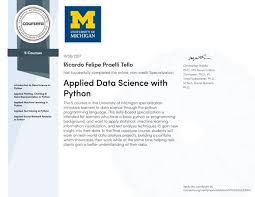Coursera Python for Data Science
Python has emerged as a powerful programming language for data science, and Coursera offers a comprehensive course to help individuals master Python for data analysis and manipulation. Whether you are a beginner looking to enter the field of data science or an experienced professional seeking to enhance your skills, Coursera’s Python for Data Science course is designed to cater to all levels of proficiency.
The course covers essential topics such as data manipulation, data cleaning, data visualization, and machine learning using Python libraries such as NumPy, Pandas, Matplotlib, and Scikit-Learn. Through hands-on exercises and real-world projects, participants gain practical experience in applying Python to solve complex data science problems.
One of the key advantages of Coursera’s Python for Data Science course is its flexibility. Participants can learn at their own pace and schedule, making it ideal for working professionals or students with busy schedules. Additionally, the course offers opportunities for peer interaction and feedback through discussion forums and collaborative projects.
Upon successful completion of the course, participants receive a certificate that can be showcased on their resume or LinkedIn profile, demonstrating their proficiency in Python for data science. This certification can open doors to various career opportunities in fields such as data analysis, machine learning, artificial intelligence, and more.
Whether you are looking to kickstart your career in data science or enhance your existing skills, Coursera’s Python for Data Science course provides a structured and engaging learning experience that equips you with the knowledge and tools needed to succeed in this rapidly growing field.
Five Essential Tips for Mastering Python for Data Science with Coursera
- Complete the course ‘Python for Data Science’ on Coursera to gain a solid foundation in Python programming.
- Practice coding regularly to improve your skills and understanding of Python for data science.
- Engage with the course community and forums to ask questions and collaborate with other learners.
- Apply the concepts learned in the course to real-world projects or datasets to enhance your practical knowledge.
- Stay updated with new developments in Python and data science by exploring additional resources recommended in the course.
Complete the course ‘Python for Data Science’ on Coursera to gain a solid foundation in Python programming.
By completing the course ‘Python for Data Science’ on Coursera, individuals can establish a strong foundation in Python programming specifically tailored for data science applications. This comprehensive course equips participants with the essential skills and knowledge needed to manipulate, analyse, and visualise data using Python libraries. Whether you are new to programming or seeking to enhance your proficiency in Python, this course provides a structured learning path that empowers learners to excel in the field of data science.
Practice coding regularly to improve your skills and understanding of Python for data science.
To excel in Python for data science on Coursera, it is crucial to dedicate time to practice coding regularly. By consistently engaging with coding exercises and projects, you can enhance your skills and deepen your understanding of Python’s applications in data science. Regular practice not only helps you become more proficient in writing code but also allows you to tackle increasingly complex problems with confidence. Embracing a routine of consistent practice will undoubtedly sharpen your abilities and empower you to excel in the realm of data science using Python.
Engage with the course community and forums to ask questions and collaborate with other learners.
Engaging with the course community and forums while taking Coursera’s Python for Data Science course is a valuable tip to enhance your learning experience. By actively participating in discussions, asking questions, and collaborating with other learners, you can gain new insights, perspectives, and solutions to challenging problems. The course community provides a supportive environment where you can share ideas, seek help when needed, and build connections with like-minded individuals who share your passion for data science. Embracing this collaborative approach can not only deepen your understanding of Python for data science but also foster a sense of belonging and camaraderie within the online learning community.
Apply the concepts learned in the course to real-world projects or datasets to enhance your practical knowledge.
To maximise your learning experience in Coursera’s Python for Data Science course, it is highly recommended to apply the concepts learned to real-world projects or datasets. By working on practical applications, you can deepen your understanding of the material and gain valuable hands-on experience. This approach not only reinforces your knowledge but also prepares you for tackling real challenges in data science. Engaging with real-world projects allows you to see the direct impact of the concepts you have learned and helps you build a strong foundation for a successful career in data science.
Stay updated with new developments in Python and data science by exploring additional resources recommended in the course.
To maximise your learning experience in Coursera’s Python for Data Science course, it is crucial to stay informed about the latest advancements in Python and data science. One effective way to achieve this is by exploring additional resources recommended within the course. By delving into these supplementary materials, you can deepen your understanding of key concepts, stay abreast of new tools and techniques, and enhance your practical skills in data analysis and manipulation. Keeping yourself updated with new developments will not only enrich your learning journey but also equip you with the knowledge and expertise needed to excel in the dynamic field of data science.

No Responses